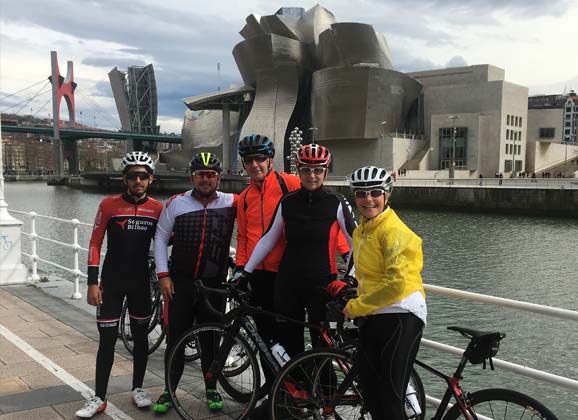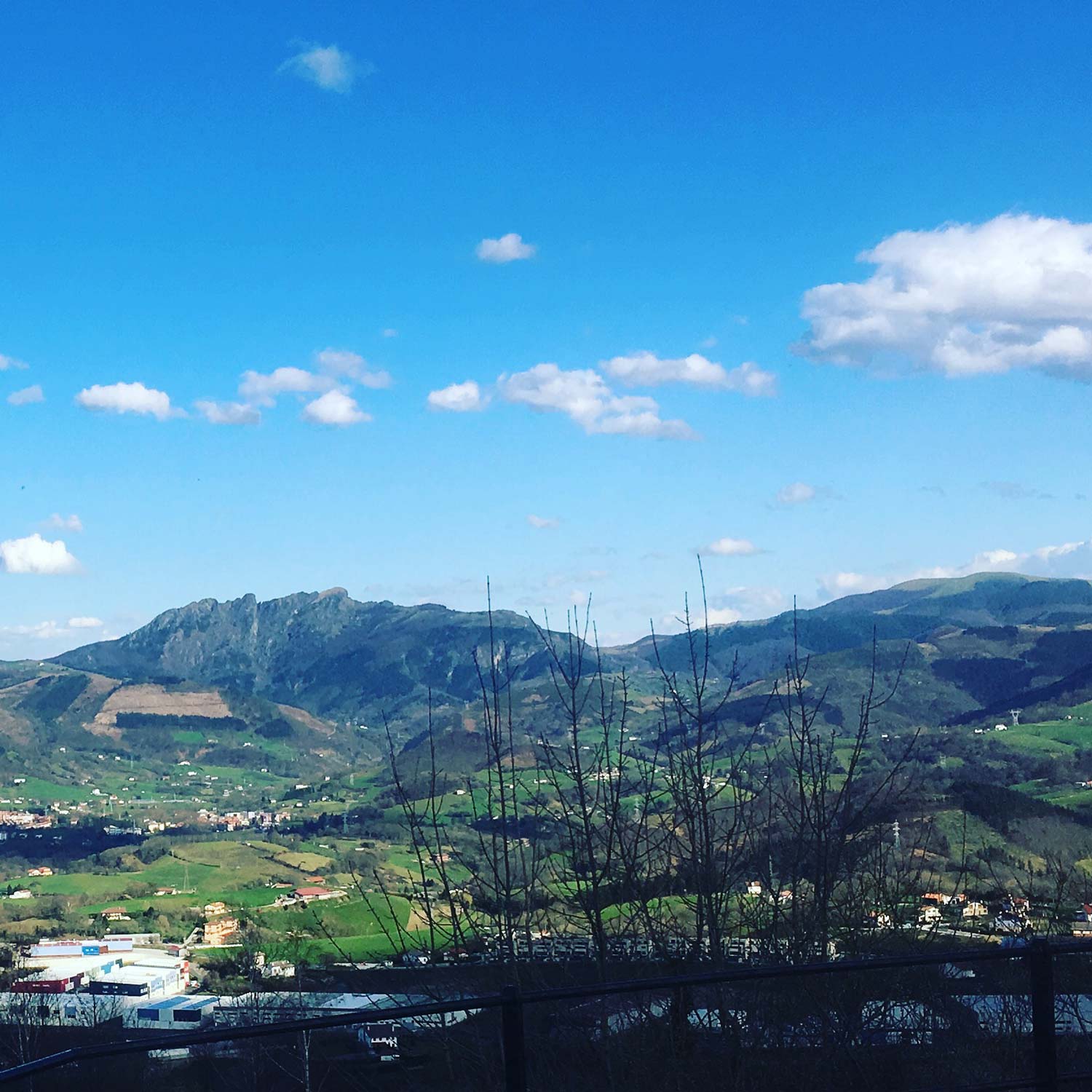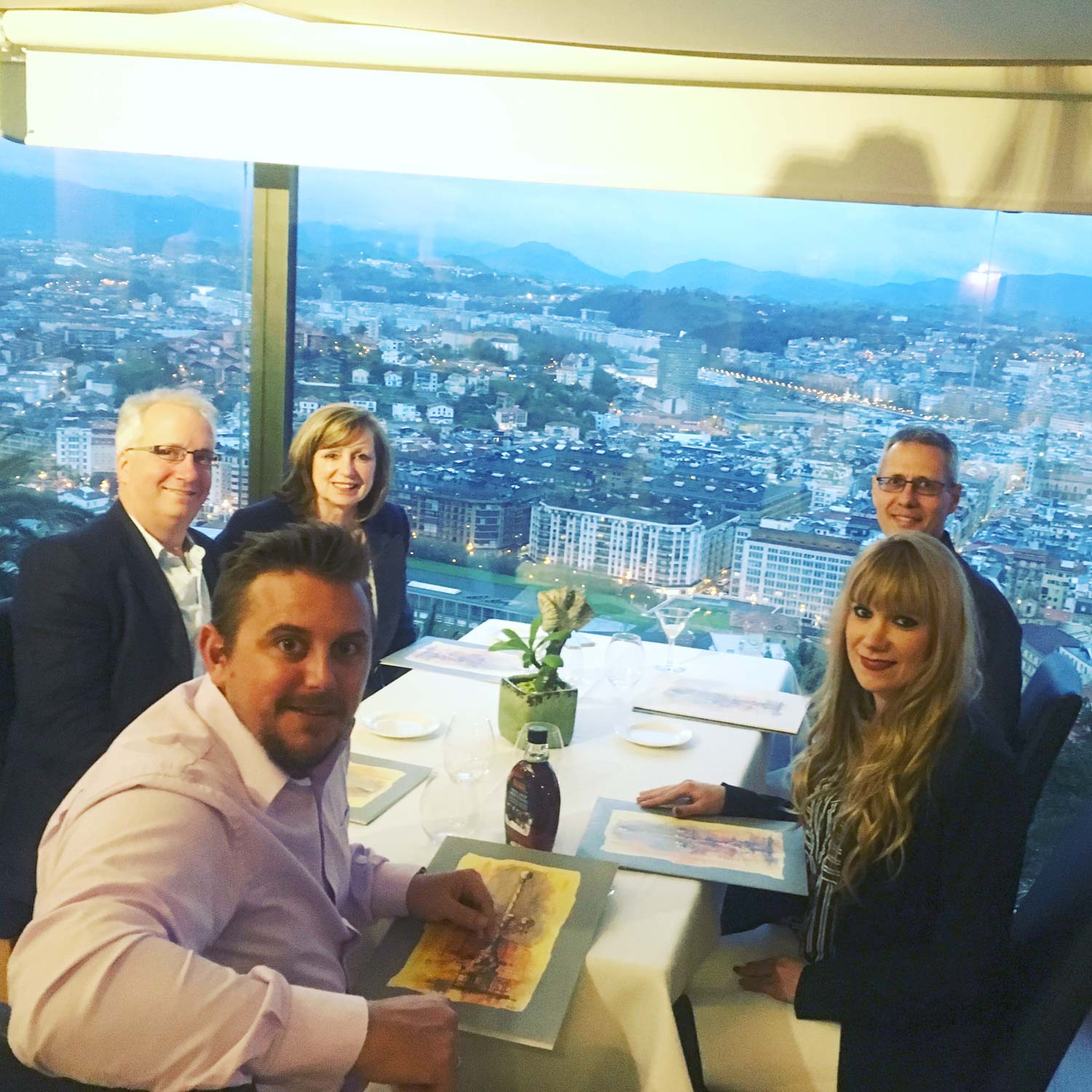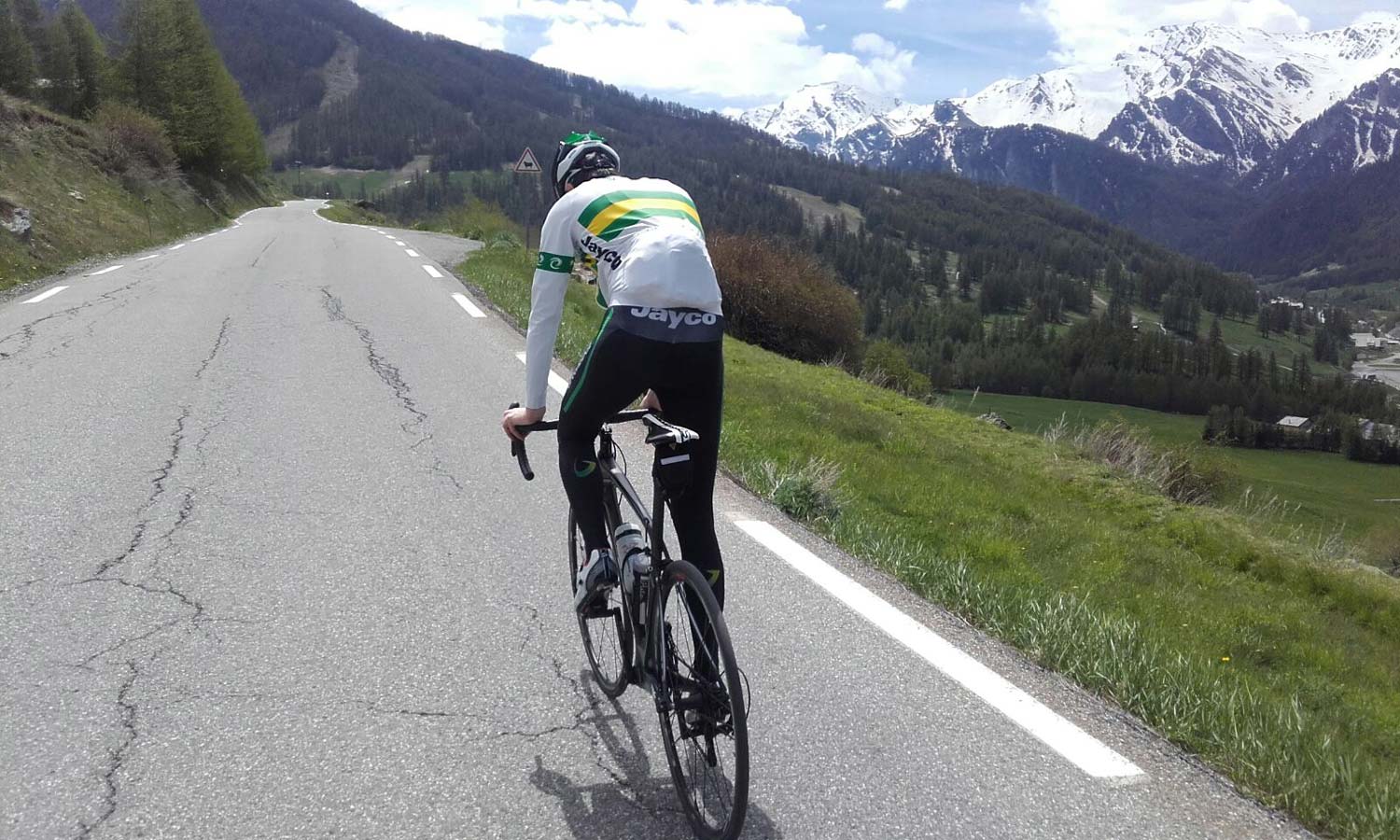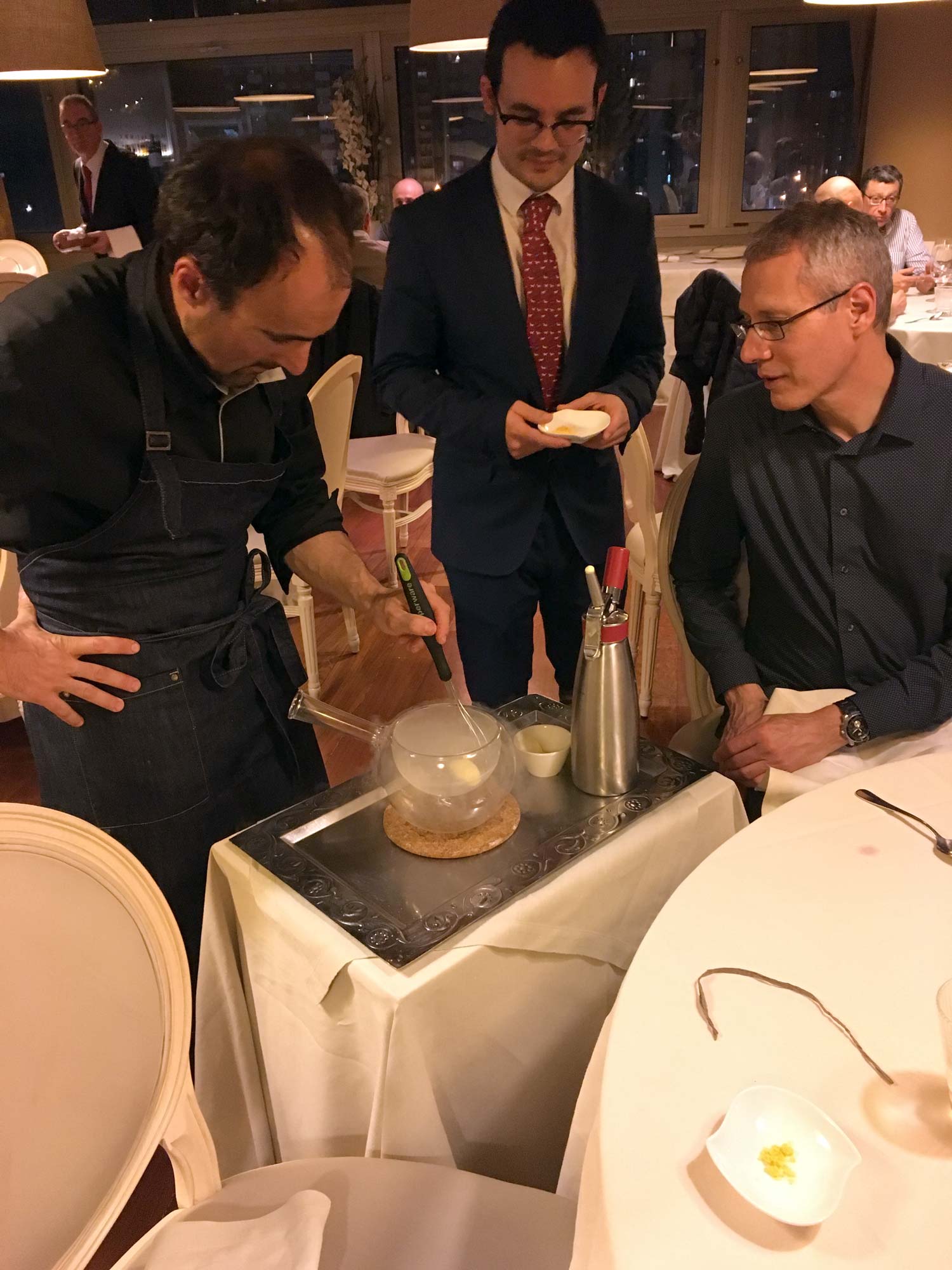As Australians settle into the winter months, the mountain roads of Europe are warming up and thoughts of cycling holidays on The Continent tend to emerge. We recently caught up with Allan Davis, a regular on the Australian national team for many years, to find out what he’s doing now that he’s no longer racing his bike.
In part one of our interview, he explains the creation of ‘Allan Davis Cycling’ a company that caters for boutique cycling holidays in Europe.
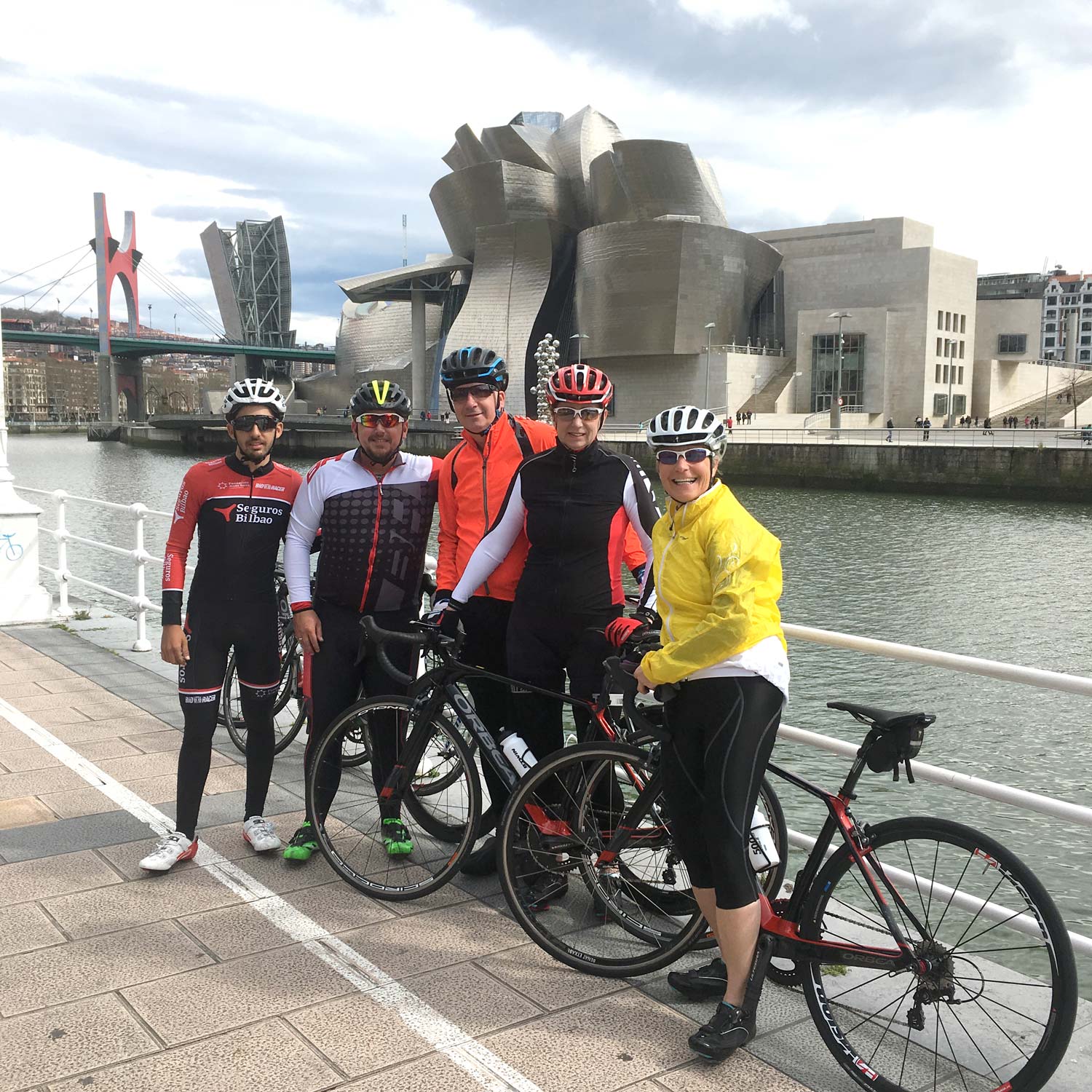
Allan Davis (second from left) race for Australia and pro teams for many years but these days he’s riding with clients who are keen to see Europe with the help of a host with some stories to share.
It began with a simple exchange: a text message asking if we would like to hear more about some rather unique cycling holiday packages being offered by former pro cyclist Allan Davis. The ‘Bundy’ boy is now particularly Basque. He lives in the north of Spain after retiring from racing three years ago.
He began riding his bike in Bundaberg, Queensland. His father, ‘Froggy’, was a good cyclist. His brother, Scott, also raced. And the move to Europe came early for Allan. The younger sibling quickly adapted to an international lifestyle.
There have been many highlights for ‘Alby’ in a career that essentially began when he was still a junior. He raced for Italian, Spanish, American, Belgian, Kazakhstani and Australian teams in a career that spanned 2001 through to 2013.
Now Allan is organising trips for small groups of people interested in seeing various locations in Europe while on the bike. The competitive years came to an odd end, essentially fizzling out after a couple of years with Orica-GreenEdge.
The sequence of teams is such: Mapei, ONCE-Eroski, Liberty Seguros, Astana, Quickstep, Astana, Orica-GreenEdge… retired.
Since he was 17 he has lived away from home. Cycling made it that way.
After years in Italy, he moved to Spain because of contractual requirements: race for a Spanish team, live there. And he’s not likely to leave.
Separated from his first wife, he is now engaged to marry a Basque woman he met in his final year as a pro. The couple had a baby girl last year.
And Allan Davis’ racing days now seem a long way behind him.
When he stopped competing he was 71kg. He’s a short rider, 171cm. He had raced at around 65kg but the end of his career and an ACL complaint meant that he stacked on the kilos when he stopped being a professional cyclist.
In 2015, he reached his maximum. The ligament injury near his knee put a sudden end to exercise and, combined with retirement, a new partner, young child, and the quest to begin a new business, a person who had always been particularly active was forced to become sedentary.
It took a toll on Alby, physically and emotionally. Through it all, he knew one thing: he loves riding the bike. When Davis didn’t ride, he grew. He gained weight and got up to 108kg. But he’s riding again and the effects are positive, both on his body and mind.
He’s back down to 95kg and he is regularly riding his bike because he wants to, and also because it’s part of his holiday offerings; his guests can ride shoulder-to-shoulder with someone who has plenty of history as a pro cyclist, someone who has stories to tell, and someone with great knowledge of many regions in Europe.
We’ve said it before and will say it again: a rider rides.
* * * * *
There aren’t many Bundy boys who find themselves speaking Basque and riding a bike around Europe for a job. Allan Davis has done that for almost 20 years. He was paid to race in the pro peloton and now he’s being paid to ride alongside holidaying guests.
It’s always interesting to find out what happens to racers when the stop doing that and become riders.
You can find out more about Allan Davis Cycling and the holiday packages he offers on his site. But we take a look back on what led him to be doing what he now does.
– Interview by Rob Arnold
Part 01 The Holidays
RIDE: I’m talking to Allan Davis on Skype. We’ve just been having a chat about old times but also good times and basically what the future holds. He’s got some cycling holidays going on in Spain – and all over the place, in fact. Tell us a little bit about what you’re up to with the holidays because it sounds like you’re having fun again.
Allan Davis: “I’ve pretty much started a cycle tourist holiday company and have retired from racing. I’m still enjoying cycling as well as including packages with Michelin star dining, luxury accommodation… and just enjoying cycling for what it is: going out and enjoying a ride in the mornings and the luxuries of life ‘later on’.
“Sometimes I combine packages during races, so we get to enjoy the racing side of it as well – that’s basically what the clients want and I prepare something that they desire [from] what they [tell] me. I get the package done, get it completed.”
And you ride along. You don’t need to relive the ‘Glory Days’, you just listen to what they want to do with their ride [while] showing them the part of the world you know. I think it’s interesting. A lot of tour companies exist but you, for example, took a group of Canadian clients to the [Vuelta] al Paìs Vasco which is a race which isn’t ordinarily on the tourist calendar. What did they get out of it? It must have been something different for them.
“Yeah, definitely. I’ve been over here racing for 17 years now… to be honest, I pretty much know Europe like the back of my hand, a lot better than Australia. So it’s quite easy for me to prepare something unique and something great for the clients because it’s pretty much in my back yard.
“I thought, ‘I’ve lived in the Basque country for 15 years now…’ – and obviously we have the Vuelta al Pais Vasco, it’s a WorldTour event here, and the Clasica San Sebastian, and I know how picturesque the countryside is here and the dining is second to none.
“The amount of Michelin star restaurants in the vicinity of Basque country is second, I think, to Tokyo with the number of restaurants, statistically. So I combined something like that with the race.
“And I had a group of Canadians, a wonderful group of clients who came this year. I’m the first guy to combine a tour with the race and they had a ball.
“I had a ball showing them around. It was something unique, something that’s never been done before and they said that they’d definitely be coming back and they’re spreading the word. Especially for Canadians, I mean they were coming from snow and had been on the rollers and ergos for a couple of months over Christmas so they didn’t mind a couple of drops of rain in April which we do have here in the Basque country sometimes…
“We had a ball. It was an excellent trip.”
Is that going to be the theme of what you’re doing? I know there’s interest in the Vuelta but is it significant enough… or are you just catering for boutique groups? What’s the scope of your venture?
“Basically I try and keep it as luxury tours with the high end accommodation and I like to add in some nice dinners on every second night of the trips that I do.
“I have [a package] for the Vuelta a España. I also have a group coming over who want to do the northern Italian lakes and Dolomites and Alps as well, in August.
“So it’s pretty much just Europe in general. I have another group coming to do the Pyrenees in France.
“So it’s not only Spain and the Basque country, it’s all over Europe…
“Of course there are plenty of stories to tell from over the years. There’s been that many races on the majority of the mountain roads in Europe so there’s always a story to tell and it’s pretty cool just to still be involved in cycling and give something back to the sport and enjoy cycling for what it is.
“And show others about it was well, [people] who haven’t seen it from an ex-professional’s point of view.”

Guests of Allan Davis Cycling and former team-mate, Luis Léon Sanchez, during the Vuelta al Pais Vasco earlier this year.
You retired not that long ago. And I guess the last bout of racing – the last international podium – was the bronze medal in Geelong. Then you had a couple of years with GreenEdge and, how long have you been retired now?
“Three years now.”
Does it feel like three years or does it feel like 40 kilos?
[Laughs] “Both.
“Well, 20 kilos and three years.”
It’s clear that you like riding your bike again. Mat Rogers told me when he quit rugby league and union – and playing football professionally – that he was really tempted to hit the grog and have a good time. He said that that span of rebellion – against sport, I guess – lasted about a year and he found it absolutely boring. Since then he’s found the bike. And he’s found that to be a big release and it’s been really beneficial for him. I often talk about Mat Rogers because I find him an interesting character but you, since retirement, did gain a bit of weight and it sounds like now – when you’re riding with your clients – that you’re getting the enjoyment that they’re getting from it. Is the bike now part of you again?
“Yeah. The Mat Rogers story is pretty similar. I can definitely relate to that.
“I retired and I pretty much still wanted to race for a couple more years. I had spoken with Euskaltel-Euskadi about keeping on riding… and obviously that team folded so I was left high and dry without a contract.
“I had to make the decision to retire.
“The first feeling was that I was a bit over it.
“I started racing when I was 10, was a professional for 12 years, and I spent another four or five years before that with the Australian Institute of Sport (AIS) and the Queensland Academy of Sport (QAS). It was pretty intense as a young guy.
“It was over 20 years of dedicating my life and all my spare time to the bike.
“Then I stopped and I didn’t want to see a bike. I wanted just to live a normal life. I started playing soccer which I played as a young guy before I got seriously into cycling.
“I joined up with the local soccer team and I was keeping fit by playing soccer and training mid-week and playing on weekends. That was really good. I was having a good time, just living a normal life.
“Unfortunately I ruptured my ACL in my knee so all my sporting interests got stopped. The doors closed on all that straight away.
“I actually came back to Spain with my partner and our daughter and it took a year to get the operation done. That year was when I put on a lot of weight.
“I couldn’t run anymore, obviously. I couldn’t do many sports at all other than swimming and riding.
“At the time, I was pretty much over riding so I just put on a lot of weight over that 12 months, got the operation done and then I started rehab from the op in May 2015. So, for the last year, I’ve been enjoying getting back on the bike and doing other sports as well.
“I lost a bit of weight again and am now enjoying riding with clients and enjoying cycling, the sport of cycling, for what it is – the wind in your hair, the freedom that you feel when you’re just riding around. And to show that to clients in a business sense is priceless to me, it’s something that I really enjoy and I love.
“I answer a lot of questions that are asked by the clients and it’s just something that I really enjoy doing now.”
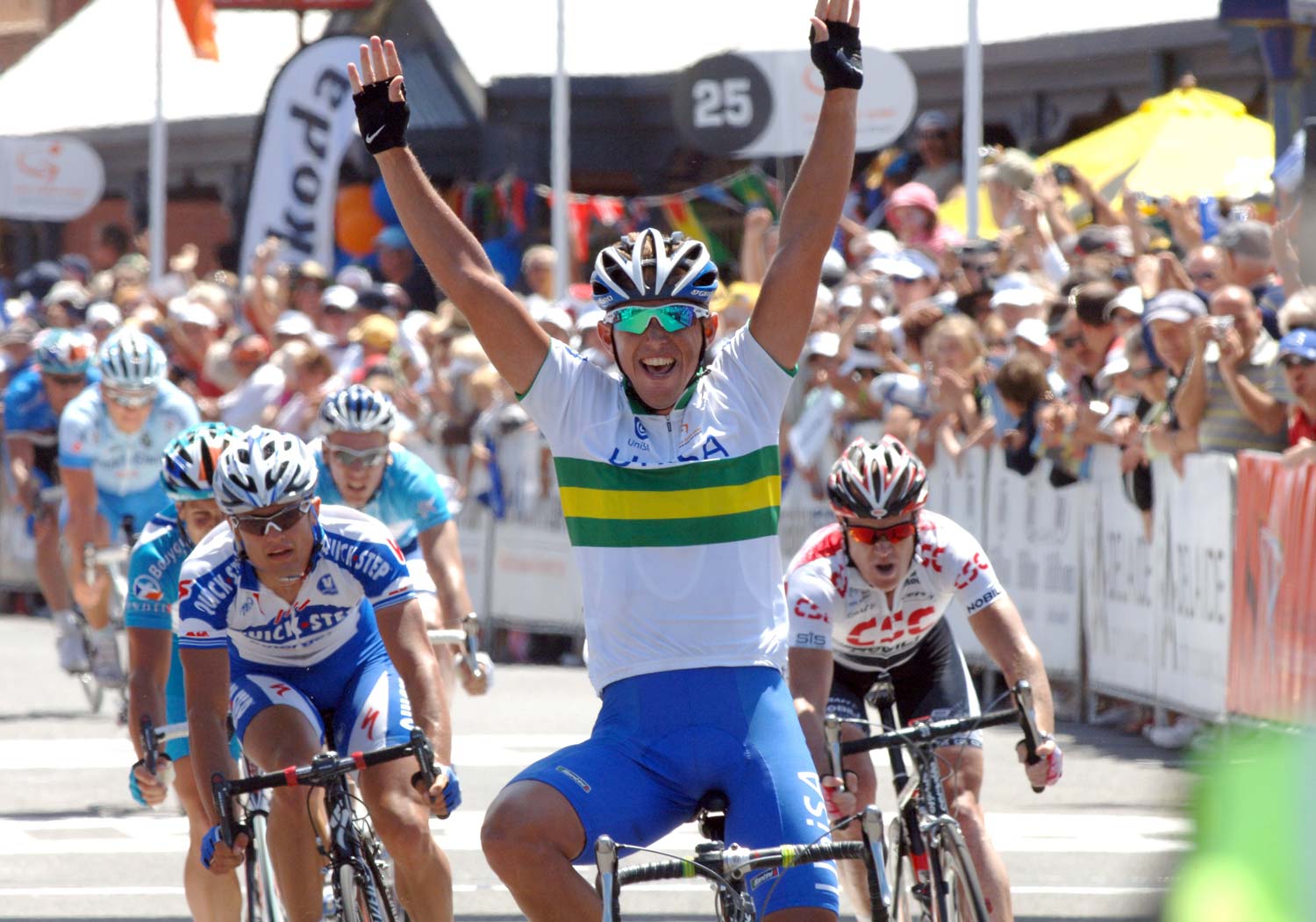
Allan Davis contested every Tour Down Under from when he was an 18-year-old in 1999 through to 2009 when he won the title.
Here he wins a stage in 2008 as part of the composite UniSA team.
Photo: Graham Watson
At that time when you first moved started visiting Europe, you already had a pretty strong grasp of Italian. This question is removed from cycling – because you’ve now gained a cultural experience of Europe – and to speak Italian as an 18-year-old Bundaberg boy is interesting in itself. But you now take people around the Basque Country and it’s language that not many people are able to get command of. You learned Italian, then French, then Spanish, then Basque… what’s the acquisition of knowledge that you’ve got thanks to being able to ride your bike?
“Basically being thrown in the deep end always works for languages, in my experience anyway.
“I left Bundaberg when I was 17. I first made the Australian team and came to Europe in 1997. We did three months in Italy before we raced the world championships in San Sebastian, Spain.
“That was my first trip out of Australia and obviously that year I was with the Australian guys, with the national team, so we picked up a little bit over the three months we were in Italy. I just remembered it for the next year.
“I got put up with an Italian team as a second-year under-19. I was 18 at the time and that was the deep end: I got thrown into a house with 10 or 11 Italian 18-year-olds in the same team as me. I picked Italian up pretty quickly, don’t worry about that.
“There was no internet in those days; I couldn’t just get on Google or whatever. I was a case of learn or it’s going to be a pretty tough road.
“They were really nice, the guys I had in the team and in the house living with me for the whole year of 1998. So that’s where my Italian really started.
“At that stage, I wouldn’t be really good in court but I could speak really good street Italian – it wasn’t very formal Italian at all – but that’s where I started my language profiles, so to speak.
“Obviously, coming from Bundy – with my laidback Australian/Queensland accent – it’s a pretty unique combination to have all these languages.
“I actually stayed in Italy in 1999; first of all I got into the Australian Institute of Sport and the whole set-up is in Italy so for 1999, 2000 and 2001 I was still with the AIS and living 10 months out of the year near Varese. And I just got better and better at Italian each year.
“Then I signed with ONCE-Eroski and moved to Spain and the Basque Country in 2003. Part of the protocol was that I had come to Spain to live and from my Italian background, language-wise, I picked up Spanish pretty quickly. They are pretty similar Latin-based languages and I live right on the French border – I used to train in France every day.
“I’ve been here for 15 years now so French came along.
“Then I met my Basque fiancée and obviously she speaks Basque to our daughter now and we speak Spanish together and I speak Australian/Queenslandian to our daughter so there are three languages every day.
“That’s how I picked it up: a bit of study here and there, but it’s pretty much just getting thrown in the deep end being forced to use it.”
A lot of people have multiple languages but Basque is an exceptional one, it’s a little bit special. And I’m sure the Canadian clients got something out of that week at the Vuelta al Pais Vasco.
“It comes in handy just for any scenario that unfolds during the tours now, I’m a ‘local’ so I can speak the language. I can to the police, I can go the hospital if there are crashes… and it’s really good to be able to have that, especially in a business now when I have clients coming from all over the globe.
“For their reassurance, there’s the knowledge that they’re in good hands with me and my team.”
* * * * *


